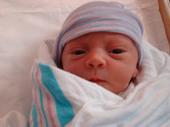CLICK HERE FOR DISS ON ITUNES.
So, what's a "Diss" anyway, besides slang for an insult?
"Well, hopefully it's not that in my case," laughs Tom Kercheval, a.k.a. Diss to those who know his music.
"I used to be in a band called 'The Dissidents'," he explains, "and when I first discovered the internet, my e-mail address featured the word 'Dissident.' People just started calling me 'Diss' for short, and the name just stuck."
But a Diss by any other name would still be producing the same fiery, guitar-driven music, a fire sparked in Diss' youth by revolutionary guitar bands like Big Country, U2, The Clash and others. "Those bands opened my eyes to the real power of music, how it could impact your emotions so strongly, how it could shape your life," Diss says emphatically. "I saw how bands could sing about spiritual things without sounding cold or preachy, how rock and roll did not have to be solely a 'below-the-belt' kind of medium, how music could actually weave itself into your soul and become a part of you forever. Music was just so important to me from an early age, especially during dark periods in my life. It's been my refuge, a great source of strength. I started playing guitar not because I wanted to be the next virtuoso, but because I wanted to write songs, songs that would hopefully touch others the way my favorite music touched me. The guitar was just my weapon of choice."
As evidenced on Greenhorn , the guitar is also Diss' most varied weapon, whether it's unveiling lush, jangly chords on "40 Paces" or unleashing the raw grit of "Blood of the Martyrs." But there are other surprises in his arsenal, as well. Diss, who's responsible for every note on the CD this time (save for some backing vocals by wife Joanie), also plays bass, mandolin, keyboards, percussion, tin whistle and basically anything else he can get his hands on.
The resulting sound is a big one, a unique hybrid of rock and hard-edged folk."I've always loved Celtic and American folk music," Diss says, "and I've incorporated those influences into my own stuff. And I also love the alt-country scene that's happening today, with incredible songwriters like Patty Griffin, Buddy and Julie Miller, Emmylou Harris and so many others really making some incredible music. On the other hand, I'm also a big fan of groups like Rage Against the Machine and The Clash, and KISS was a huge influence when I was a kid. In other words, I still love those big, nasty guitars. I guess what comes out after everything has been mixed together is a sort of hard-edged, electric American folk music. At least that's what I aspire for it to be. I like to refer to it as 'Power Folk.' "
Lyrically, Diss' songs don't often tread the political territory explored by his early influences, like U2, for instance. They focus instead on basic human emotions and experiences that anyone of any political mindset can relate to.
"There's a common thread that runs through my music," Diss says, "and that is hope amidst struggle. There are a lot of dark elements in the songs, but I've never been able to write a song without offering some sort of light in the darkness, even if it's just a glimmer."
The call and response chorus lyrics for "Blood of the Martyrs" - from Greenhorn - offer a good example of that glimmer, sparkling through an aching lament of loss and pain.
And the long lost heroes who fell betrayed
(They're all coming back)
And the dreams we buried that fear decayed
(They're all coming back)
And the voices singing forbidden songs
(They're all coming back)
And the ones they told us were dead and gone
(They're all coming back)
But Diss' soundscapes aren't always lined with clouds. There's plenty of sheer, unbridled joy on the horizon as well, from the punky "Girl with Green Eyes" to the declaration of independence that is "Warhorse."
"I try to hit on a lot of different emotions in the songs," Diss says, "but in the end, I try to offer something positive. There's a lot of pain in the songs, but it's more about overcoming the pain than wallowing in it."
As Greenhorn begins to make way for Diss' next offering (his latest new song, Stare You Down, is now available for download), Diss remains content to deliver his music on exactly his own terms. The internet is fantastic, he says. As a musician, it's like a whole new lease on life, because I can create and distribute my songs exactly as I see fit, with no outside influence if that's what I choose, and they can be heard by anyone, anywhere. That is incredibly exciting. To get a comment from someone in Scotland, for instance, saying they loved your song that you wrote on your couch in small town America, that's just the best feeling.
It's a feeling Diss hopes to savor many times over, for a long time to come. "My goals are simple," he says. "To keep making music and hopefully touch or inspire more people through my songs. To be able to do that is the only definition of success I have or ever will have."
